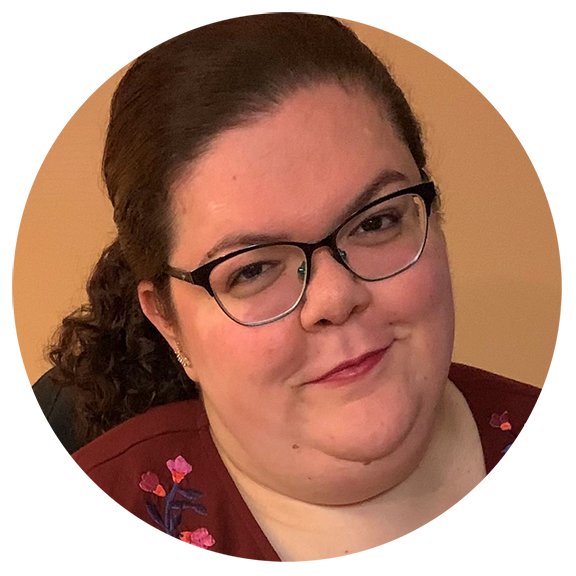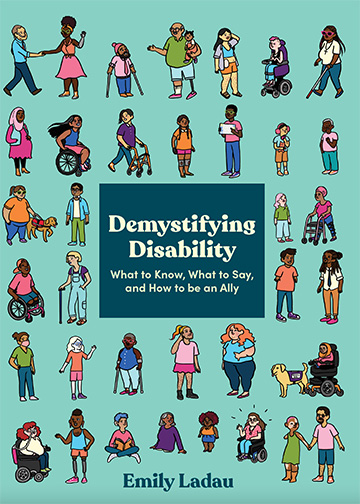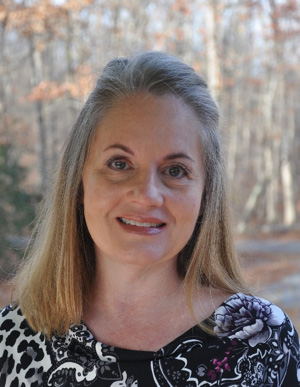
e’re so excited to interview Emily Ladau, the celebrated and internationally known disability rights activist, writer, and speaker. Her new book, Demystifying Disability: What to Know, What to Say, and How to Be an Ally will be released by Ten Speed Press (an imprint of Random House Penguin) on September 7.
A native of Long Island, New York, Emily has forged a career building allies for the disabled community across the world. She’s the Editor-in-Chief of the Rooted in Rights blog, a platform dedicated to amplifying authentic narratives of the intersectional disability experience. She also co-hosts The Accessible Stall, a podcast about disability issues. Ladau’s writing has been published in outlets including the New York Times, HuffPost, CNN, Self, Salon, Vice, The Daily Beast, and more. Her work is also included in the Criptiques Anthology and About Us: Essays from the Disability Series of the New York Times. In addition, she regularly serves as an expert source on disability issues for media such as NPR, Vox, Washington Post, and Teen Vogue.

WOW: Emily, congratulations on the debut of Demystifying Disability, which has already been lauded as a “wonderfully accessible and intimate volume” (Emily Perl Kingsley, writer for Sesame Street) and “powerful reminder that disability is a vast spectrum with a wide range of voices and experiences” (Grace Bonney, author of In the Company of Women).
This important book is long overdue! Tell us about the moment you knew you wanted to write it.
Emily: Thank you so much! I’m really excited to be able to share more about the book with you. Truth be told, writing this specific book wasn’t something I’d anticipated doing. I appeared on a podcast in early 2019 and a literary agent from Present Perfect reached out to me after listening to say she’d read my writing previously and wondered if I’d considered a book. So, the opportunity knocked on my door and I knew I wanted to go for it.
WOW: How long did it take to write the book?
Emily: It was a journey! I started the process of writing the book proposal in May 2019 and didn’t finish final edits on the book until September 2020.
WOW: How many people did you interview?
Emily: Around 40!
WOW: Impressive! Your book includes advice on avoiding “ableism.” How do you define this term and what does it mean for the disabled community?
Emily: Glad you asked! In the book, I share the definition of ableism that I use: “Ableism is attitudes, actions, and circumstances that devalue people because they are disabled or perceived as having a disability.” Our world is filled with examples of ableism, both on individual and systemic levels. My goal is to help shift that.
WOW: Thank you for that. Thank you also for devoting a section to the identification of stereotypes in media. I’m gratified by the bravery of actress Selma Blair, who is sharing her journey with multiple sclerosis in a new docudrama for Discovery+ next month, but I feel as if there is still so much ground to be gained. Are you optimistic about the future of more space for the authentic experiences of disabled persons in entertainment and other media?
Emily: I’m also an admirer of Selma Blair and the grace with which she shares her journey. And I agree we’ve got a long way to go when it comes to authentic, accurate representation of disability in the media. That said, I believe we’re moving in the right direction—more books being published by disabled authors, more movies and TV shows featuring disabled actors. So many disabled people are putting themselves out there and being the representation they hope to see. My hope is this will continue to be a shifting trend in the mainstream, opening up more opportunities and increasing acceptance.
WOW: As a M.S. warrior myself, I was heartened to learn that I’m actually part of the largest minority in the world, in that one in five people also have a disability. Are other people as surprised as me to learn this? Why do you think this is so?
Emily: My guess is that lots of people (both with and without disabilities) are surprised to learn how many disabled people there are in the world. Disability is the only identity that cuts across all other identities, and it’s the only identity group anyone can join at any time (not a threat, don’t worry!), but it remains on the margins of marginalization. It’s still taboo to acknowledge. One of the goals of my book is to help change that.

“Don’t let imaginary other people into your head who judge the words before they’re on the page. Write your story for yourself, because the person who matters most in your story is you.”
WOW: Many writers in the WOW audience are also working on nonfiction books. Now that you’re an author of your own book, what’s the most important thing you’ve learned about the development process?
Emily: Great question! The writing process really forced me (in a good way) to take note of my own gaps in knowledge. I often remind people that we are all experts on our own experiences, but not on the experiences of anyone else. It’s okay to not know it all. None of us do.
WOW: As you know, I adored your essay in The New York Times, “Playing the Online Dating Game, in a Wheelchair.” (reprinted in the anthology About Us.) Your vulnerability, courage, and sense of humor captivated me from the beginning, starting with your choice to message a man with an iguana on his shoulder, and later, your characterization of the disclosure of your illness as deciding when to drop “the wheelchair bomb.”
Wry humor aside, your essay is the perfect example of a story arc with personal growth, ups and downs included, before you finally decide to be upfront about your disability. Do you have advice for other writers when writing about, to use your words, a “secret shame”?
Emily: This means so much! First and foremost, I want to share a reminder that it’s okay to keep certain parts of your life experience just for yourself. Not every deeply personal moment needs to be fodder for writing. But when you do choose to be vulnerable in your work, own it. Don’t let imaginary other people into your head who judge the words before they’re on the page. Write your story for yourself, because the person who matters most in your story is you.
WOW: Terrific advice. Do you mind sharing what it was like to work with famed New York Times editor Peter Catapano?
Emily: It was a lovely experience! He’s been such a strong advocate and ally for inclusion of disability perspectives in the op-ed section, and I feel lucky to have been part of it.
WOW: What I love most about your essay is the hope you give everyone—disabled or not—who’s playing the online dating game. Being true to ourselves is always the best approach, and curious minds want to know! Do you mind giving us an update on your dating life?
Emily: Ha! I’m happy to report that about a month after my piece about online dating was published, I ended meeting my current boyfriend. The world works in funny ways.
WOW: Yes indeed! I am so happy for you. You’ve been published in numerous national magazines and websites, and I suspect you’ve also seen a fair share of “no thanks.” Our theme this month is self-care, which is especially appropriate for writers as we often face rejection of our work. What advice can you share with our WOW readers?
Emily: Oh, absolutely. From “no thanks” to radio silence, I’ve experienced plenty of rejections. But your worth is not in what an editor thinks of your writing (easier said than internalized, but true). Your stories have value because you lived them, not because someone does or does not publish and/or pay for them.

“Your stories have value because you lived them, not because someone does or does not publish and/or pay for them.”
WOW: You are so right about that. On this note, as an editor, you’re certain to get countless pitches each week! What is the difference between a good pitch and one you’re unlikely to pursue?
Emily: I sure do. (But my inbox is always open and I welcome pitches to Rooted in Rights anytime!) To me, a good pitch is one that shows a mix of passion and poise. Clearly conveying that you know your subject and you can address it with nuance is key.
WOW: Are there any “no-nos”? What might a writer do that makes you not want to work with them?
Emily: Time and again, writers pitch me without first checking submission guidelines. Or, it’s clear they’ve not read any previously published pieces. Know your outlets before you pitch!
WOW: Right on! You are one busy lady and a master of juggling multiple platforms, from publications and a blog to podcast and video. What do you do like to do when you’re not working?
Emily: I admittedly need to work on working less, but when I’m taking time for myself, I truly love spending it outside, roaming local towns, paths, and parks. I also love escapist reads, and I’m always up for a good Netflix binge.

WOW: Do you have any other projects coming up that you’d like to tell us about?
Emily: I’d love to invite people to join me for my book launch event, hosted by Bluestockings Cooperative! I’ll be in conversation with disability advocate Xian Horn and I’d love for people to tune in. You can register here.
WOW: Thank you! I’ve already signed up, and I’m so looking forward to it.
Emily, you are an inspiration to me and countless others. Thank you for your tireless advocacy for the disabled community and for your leadership in the writing sphere, which is making the world a much better place. We also appreciate you spending time with us today, and on behalf of all of us at WOW, we are honored to watch you continue to soar!
***

Ashley Memory has written for many magazines, including Real Simple, Wired, Permafrost, Rooted in Rights, The Independent, Poets & Writers, and O.Henry. She writes the monthly submissions column for WOW and serves as critique editor and judge for the WOW flash fiction and creative nonfiction contests. She lives in rural North Carolina, southwest of Asheboro, and when she’s not hollering for the dogs, she’s marveling at the antics of the nuthatches and chickadees on her birdfeeder. Find her on Twitter @memoryashley or ashley-memory.com.